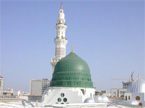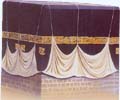



| 1) FAITH . 2) PRAYER Prayers are said at dawn, noon, mid-afternoon, sunset and nightfall, and thus determine the rhythm of the entire day. Although it is preferable to worship together in a mosque, a Muslim may pray almost anywhere, such as in fields, offices, factories and universities. Visitors to the Muslim world are struck by the centrality of prayers in daily life.
Each Muslim calculates his or her own zakat individually. For most purposes this involves the payment each year of two and a half percent of one's capital. A pious person may also give as much as he or she pleases as sadaqa, and does so preferably in secret. Although this word can be translated as 'voluntary charity' it has a wider meaning. The Prophet said 'even meeting your brother with a cheerful face is charity.' The Prophet said: 'Charity is a necessity for every Muslim. ' He was asked: 'What if a person has nothing?' The Prophet replied: 'He should work with his own hands for his benefit and then give something out of such earnings in charity.' The Companions asked: 'What if he is not able to work?' The Prophet said: 'He should help poor and needy persons.' The Companions further asked 'What if he cannot do even that?' The Prophet said 'He should urge others to do good.' The Companions said 'What if he lacks that also?' The Prophet said 'He should check himself from doing evil. That is also charity.' 4) THE FAST Although the fast is most beneficial to the health, it is regarded principally as a method of self purification. By cutting oneself off from worldly comforts, even for a short time, a fasting person gains true sympathy with those who go hungry as well as growth in one's spiritual life. 5) PILGRIMAGE (HAJJ) The rites of the Hajj, which are of Abrahamic origin, include circling the Ka'ba seven times, and going seven times between the mountains of Safa and Marwa as did Hagar during her search for water. Then the pilgrims stand together on the wide plain of Arafa and join in prayers for God's forgiveness, in what is often thought of as a preview of the Last Judgment. In previous centuries the Hajj was an arduous undertaking. Today, however, Saudi Arabia provides millions of people with water, modern transport, and the most up-to-date health facilities. The close of the Hajj is marked by a festival,
the Eid al-Adha, which is celebrated with prayers and the exchange of
gifts in Muslim communities everywhere. This, and the Eid al-Fitr, a
feast-day commemorating the end of Ramadan, are the main festivals of
the Muslim calendar. ^
Top |
© By Mohammed hadi |
||
All right reserved |

